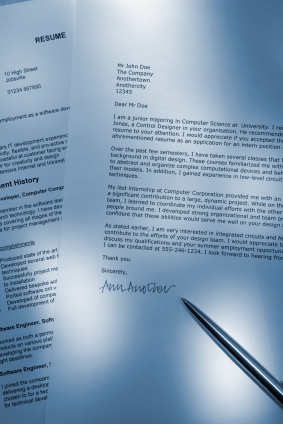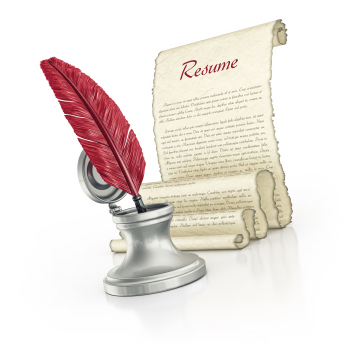
A recruiter once gave me an excellent tip when she said to change my resume every time I applied for a job. Why I asked? She told me that company recruiters will often use a keyword search to select the candidates that they feel matches the position. This keeps them from having to sort through the hundreds of resumes they receive. She said that if the resume does not have the keywords that they look for, then they typically go into the rejected pile.
Depending on the position you’re applying for, you should use words that will notify HR managers about your qualifications. For example, if you’re looking for a position as the Vice President of an accounting company you might want to include words such as:
- Tax Accounting
- Reconciliations
- Profit and Loss Statements
It can be very difficult to find a job in today’s economic climate, and looking for high level or executive work requires a keen eye, and often, knowing someone whose already in the organization. After updating your resume, send it to your friends in the industry and see if they are able to direct it to the appropriate HR managers.
If you’re looking for a job as an administrative assistant you should use the following words when updating your resume:
- Ability to type 80 wpm
- Microsoft Office
- Mac office
- Reception
- Phone support
No matter the type of work you’re looking for make sure you ask past colleagues or friends if they know of any open positions within their companies. It’s always an excellent decision to put your feelers out and see what kind of work is available. And always change up your resume to meet the requirements of the job. It may be a entry-level position, but as long as you can turn it into something down the road, it may be worth looking into.
Tips for Working with Keyword Search Software
Many companies will use a type of software that identifies keywords in resumes. But what can you do to beat these machines?
Revise your resume so it includes keywords included in the job description during your opening. Take for example, if the job description says, “Coordinate and develop websites and blogs,” your resume must include keywords such as “websites” and “blogs”. But only if you have the experience, of course…
Update your multipurpose resume with frequently used keywords so that you do not have to revise it every time you have another job interview. One idea is to revise it every six months in order to stay current. Newer keywords may be used in the future, so stay current with them.
Add the most important keywords to your cover letter. Don’t over do it though. You just want to have a few of the choice words that HR managers are looking for.

Instead of getting discouraged by the lack of response to your resume….get busy!
There are a myriad of tactics and tools you can use to improve your resume and not all are painful or require a lot of redo to your resume. The thing is – they can help you get a job and isn’t that what you want?
So how do you go about fixing your resume quickly?
- Delete your objective. Many companies do not care what you want. It’s a sad truth but one that have to live with. Removing your objective gives more space for you to focus on skills that the employer craves.
- Add a straightforward statement that explains why you are uniquely qualified for the position. Such as:Proven Marketing Leader with Far Reaching Corporate ExperienceMake sure that your statement is true and matches your job description. The last thing you want to do is make yourself out to be something that you’re not. HR Managers hate this, especially if you use a headline in your resume. But, if done correctly a statement helps recruiters immediately see that you are what they’re looking for in a candidate.
- Include a summary of skills (keyword bulleted list) -especially if you have skills related to the open position. But, also include things like certifications, features you have, language skills and any technical abilities that would set you apart from your peers. Do you understand Linux or can you program C++? Then add that on your resume. Any skills that you possess should be showcased because it gives you extra value to the employer. You may not need those skills but it’s good to have them on your resume.
- Look through job descriptions in order to identify keywords companies are looking for on your resume. This sounds trickier than it actually is but there’s a site called www.wordle.net. There you can copy and paste the job description and it will give you a simple, easy to read explanation about the keywords that your prospective employer is looking for. Keywords help your resume stand out and if a company sees that your resume has the needed keywords, you stand a better chance of landing the job. Adjust your resume according to the keywords and to match the description of the job.
- Replace weak words and statements with Power Words. Instead of saying “Contributed to the company newsletter,” write, “Managed the award winning Vista monthly publication, the flagship magazine of Made-Up Company, the world’s largest manufacturer of silicon diodes.” Both statements may be true but the second one carries a lot more weight and showcases your talents. Make sure your statements are said with power.
The job market is tough right now, so you have to take advantage of any opportunity. Do not let one slip by because your resume is not up to par. Next month check out more tips on how to improve your resume and get noticed!

We’ve all worked with really talented people we thought would never leave the company – not because they didn’t want to leave – some do. But we think that they won’t ever leave because we’ve seen their resumes and they sell themselves short and they probably wouldn’t get hired.
Some job seekers do not want to overstate their accomplishments or qualifications or seem boastful, so they paint a picture to prospective employers that they are not as amazing at their job as they really are.
Instead of being one of those people who’s afraid of change, you can use power words in your resume to take ownership of the many successes you’ve had at your past jobs. It’s not like you’re lying on your resume – far from it – you’re just highlighting (in a profound way) your accomplishments in order for them to sound more appealing to the reader.
It’s time to stop taking the backseat to your insecurities and fix your resume so that you can take your career to that next level.
One way is to use more descriptive words when describing your past accomplishments. Instead of saying on your resume, “I organized the file cabinet.”, say something like, “Devised a system of organization which led to increased worker awareness, reduced downtime and saved XYZ Company over $200,000 a year.” Both sentences are true, but the revised one really showcases what you did, how it benefited the company and the employees. Plus, it just sounds more impressive!
It’s also very important to use quantifiable statements and numbers about the contributions you made at your previous employers. These statements lend an air of credibility to your resume and give the HR Manager a glimpse into what types of budgets, figures and time frames you’re capable of succeeding with. These statements could involve how your job efforts:
- increased revenue for the 3Q by XXX dollars or percentage
- helped the company reduce costs and saved them XX dollars as a result of improved processes
- trained XX employees in a new programming language, which resulted in the company saving XX dollars, improved customer service, etc…
But, how can adding power words and quantifiable statements on your resume contribute to your job search?
It’s not just about showing how you saved the company money, improved processes, or trained new employees. It’s about putting value in yourself as an employee and showcasing what you’ve done in a way that allows HR Managers to quickly see how you could benefit their company.
If you want to improve your resumes vocabulary, go to www.thesaurus.com and spice up your resume with stronger words. Just be sure not to overdo it. You want to sound professional, not like you just tossed in some “2-dollar” words to sound smart.
Your goal is to sell yourself —and your resume is your best tool for making sure you succeed in your job search.

Many job seekers stress over cover letters more than they do their own resumes. It may surprise some, besides cover letters are typically a one-page preface to your intricately prepared resume. But, the truth is, that your resume may look dull without a good cover letter to introduce it. Cover letters introduce you to HR managers and set the tone for how your resume will be received. You can have a perfect resume, but if the cover letter is not well done, then your resume will not get the type of attention it deserves. Everyone looking for a job should have a professional cover letter and resume in order to find the career that’s right for them.
When you first enter the job market (most of us at around 21 years of age) don’t know how important cover letters are for you, much less how to write one that sells you. Many people are not aware of the benefits that a simple, well-crafted cover letter to a prospective employer can have. They introduce you to your prospective employer, but also they give a glimpse of your personality.
Just a few weeks into your job search, you will realize that a well-crafted cover letter is not an option, it’s a necessity. Through the support of a professional resume and cover letter writer, you can finally have the cover letter that sells your individual personality and traits. If you have a cover letter, it could always use another eye on it in order to see where you can make changes or additions. You want to sell yourself in your cover letter, your resume speaks to what type of experience and qualifications you have, that’s why it’s important to have a cover letter that sets you apart.
But, just having one is usually not enough. After a few weeks or months of unanswered applications and fruitless job searches, you begin to come to a final conclusion.
When you, or your cover letter writer, writes your first letter, the primary focus is on presentation and the format. How long should the cover letter be? Where to assign the date? What type of font is right for my cover letter? But, throughout you want to focus on one thing – quality content. If your cover letter is full of buzz words or just inane babble, then it’s not worth the paper it’s printed on.
It’s always important to remember, before you start writing, that content is king. It’s fairly easy to lose sight of what’s important and lose focus instead of paying attention to what’s important. That doesn’t mean that there are not guidelines to follow, but your cover letter writer can help you deal with the details. You do not want to have spelling or grammatical errors in your cover letter. That’s an instant turn off to any prospective employer. Remember that the main point of your cover letter is to get noticed and sell yourself.

Some people think that resumes are nothing more than a list of your accomplishments, the jobs you’ve had, and the number of places you’ve worked. But, it’s not that easy to construct a resume that markets you to your prospective employer. A resume should be designed to sell you and your potential to an employer. That means that you have to make decisions about how to present your traits.
A resume has to be like an advertisement, it needs to catch the reader’s eye and meet their particular needs. If you’re applying for an accounting job, then you wouldn’t need to showcase your creative writing talents on your resume. You would need to show that you have the skills required to perform the duties of the position at a high level. That doesn’t mean putting everything you’ve ever done on your resume, it just means you have to understand your market and how to reach them. Make sure you put your best foot forward.
Look over your work history and pick the selling points that best highlight your value. Depending on the position, you should highlight specific skills that you have. Deciding what makes the most unique selling points can be the hardest part of writing a resume. Here are five basic steps to help design a resume that markets your skills to employers:
1. Choose the most relevant information first. Focus on the skills and experience that are most important to the job you’re applying for. You may have a whole range of skills, but focus on the ones that are most important for your particular employer. Even if you’re qualified based on past experience, don’t put all of your eggs in one basket. Instead, make sure that you focus on the skills that are going to set you apart from other potential employees.
2. Showcase the cutting edge, without too much emphasis on the outdated. More experienced workers should focus heavily on this. Any professional should continue to update their resume with new talents and show that they can adapt to new challenges. You may know the beginnings of C+ language, but it will help if you know Flash or Linux.
3. Tangible examples are best. Be specific as possible and use tangible evidence of improvements if you can. Just saying that you have an excellent track record of improving sales doesn’t show much, you need to show actual figures.
4. Use multiple resumes to market yourself in a different manner. If you’re applying for several different types of positions or in different industries, you need to have a resume suited to that profession. So create several different resumes that highlight your skills for that particular position.
5. Get a second opinion. This is perhaps the most important thing you can do. It can be hard to be objective about your career. Give your resume to a friend or a family member, or if you have someone in your industry – even better.

Face-to-face networking is incredibly important, and if you know your way around, then you have a distinct advantage over much of your competition. You’re making a serious mistake if you do not have a social media presence or if you skip social media sites all together.
If you’ve neglected to create a social media presence, especially on LinkedIn, then you are missing out on an incredible opportunity to find open positions. Targeted, extensive networking is still the number one way to find a job, to achieve this you need to have a complete and up to date profile on several social media sites.
The reason social media is so important is because 83% of employers look to LinkedIn, Facebook and Twitter when looking for new hires. 89% rely exclusively on LinkedIn to fill their empty positions. So if you’re not using social media, then your chances of getting a job are seriously diminished.
Without a solid social media presence on LinkedIn, you make it much harder for HR managers who are looking for you specific skill set to actually find you. Employers will also review your social media sites to examine more information after they have received your resume. So you have to take the necessary steps to stand out and never put a bad face forward.
Here are some tips for putting the right social media face first:
1. Think of your online profile as your brand.
Identify your abilities that set you apart from other applicants. You should define the areas where you excel, and always make a solid case for the value that you bring to a prospective employer.
2. Use your online profile to showcase your skill set.
On Facebook and LinkedIn, there is a headline below where you put your name. This is an incredible important part of your branding, you need to put something with keywords HR mangers will instantly gravitate to. Your headline should show a range of what you are capable of doing.
3. Position yourself as the expert in your field.
Include searchable keywords in your social media profile so that HR mangers can see your in depth experience and talents. Employers will often look through social media sites in search of a fit for a specific problem, if you have your expertise highlighted, then you may be the one they’re looking for. This makes it much easier for them to find you.
4. Clear up any discrepancies between your resume and your social media profiles.
Make sure your dates of employment, job titles and other extended details match your resume. HR managers will not contact prospects who have inconsistencies on their resume and social media profile.
5. Join Facebook or LinkedIn groups that are associated with your field.
Who knows, by commenting on a group post or by offering your advanced knowledge, you could attract someone looking for your particular talents. Answering questions in these groups is an excellent way to attract attention to yourself, just make sure you approach groups with the correct mindset, you’re trying to garner the right attention. So make sure you know what you’re talking about.

Resumes mean so much to hiring managers. It’s your first introduction to a prospective employer and it’s how you differentiate yourself. But what separates the bad resumes from the good ones?
The best resumes avoid abbreviations. Abbreviations are not professional nor are they accepted. Nothing makes HR managers cringe more than seeing sentences like the following: “Answered the phone and went 2 C clients” (yes, I truly have seen this). It may be the information age but this is not a text message so don’t treat it as such.
Giving up too much personal information is a no-no. You should leave off anything related to hobbies or interests that are not related to the job. Do not include your weight and height unless you’re applying for a position as a gym trainer. If it’s not related to the job in any way, do not include it on your resume. Leave out your illnesses or why you took off 2 years to care for a dying parent. As hard as that may have been, it will count against you.
The best resumes are the best because they’re not being used as an art canvas. If you try to stand out by having large graphics on your resume it’s a bad move, because this will give you an unprofessional and amateurish looking resume. Your prospective employer only wants to see your skills, your duties and achievements. You’re not going to get anywhere by having a Word Art picture of a snail on your resume.
Keep the negativity to yourself. The best resumes are neutral in tone or highlight the best attributes of the applicant. But, if you have information on your resume that is negative, such as, leaving your previous employer because you did not like the boss, just keep that part to yourself. Do not try to explain the situation on your resume. That’s an impossible battle that you should not fight. Your resume’s job is to sell and promote you. So don’t eliminate yourself because you were negative.
Good resumes include dates. Do not make an HR manager have to guess. This kills your resume on the spot. You have to include dates. What years were you in college, did you attend graduate school or did you graduate from a trade school? How long have you been working at your current position? Do not make the hiring manager have to ask questions about your resume. The second they have to guess, your resume is going straight to the trash. Make sure your resume flows easily and there are no date gaps. If you took a year off to go travel or to go back to school, include this on your resume.
Bad resumes do not highlight achievements. Many people will fill their resumes with irrelevant information, but they leave off the most important part of the resume – focusing on their achievements. You want to stand out from other applicants, so how can you do that if you do not showcase what you’ve done. Explaining your past accomplishments means that the HR manager can see what you’ve done and know how you can fill their need. If you have the abilities, you need to showcase them on your resume.

Focusing on your experience, your background and your accomplishments is what’s known as a functional resume. Chronological resumes list all of your employers in the order of the date that you worked for them, typically with the oldest employer at the bottom of the resume. Functional resumes are great for people who are looking to make a career change, people with multiple positions with different industries, people with gaps in their employment and those just starting out on their career. However, as always, I have to warn you that recruiter and hiring people really don’t like functional style resumes. They feel you may be “hiding” something.
You can combine both resume types to give yourself a well-rounded appearance to potential employers, plus hiring managers love to see a list of previous experience, especially when it’s for a position of authority. Providing work history is an excellent way to showcase how your accomplishments have translated to actual success in the work place.
Start by writing a list of the skills that you used at your previous jobs. List them one by one so that you cover a wide range of tasks on your resume. Depending on the position you’re applying for, modify your skills to directly reflect those of the position that you’re applying for. Don’t embellish, instead focus on what you’ve accomplished and how it will allow you to succeed at your new position.
Use bullet points to provide a concise and accurate depiction of your responsibilities and where you used your skills. List our your accomplishments and try to use numbers to demonstrate an actual value. You can say something like, you promoted better paper management and turned your office into a green office, reducing the waste and lowering cost for trash maintenance by a third. Or that you increased sales in your office by 15% over a 5 year period.
Show your employer in the bullet section of your accomplishments. You want to be able to match your accomplishments with a tangible company, so make sure to list the companies where you worked. Your accomplishments only mean so much if they can be backed up. Listing your companies, or contacts you may have done a project for, will help highlight your accomplishments.
Use action verbs at the beginning of your accomplishments. Saying things like, “demonstrated” a strong desire to train new employees, is better than saying “trained staff.” Elaborate on your accomplishments, it’s all right to use descriptive words here. In fact, the HR manager may appreciate your ability to be descriptive.
Complete a short job history below the accomplishment section of your resume. This will help employers get a good idea of your work history. Make sure to include the name of the employer, your job title, the dates you worked for the employer and the location of the job. Write this list in reverse chronological order.
It’s time to get those accomplishments out there and find the job that you’ve always wanted!








